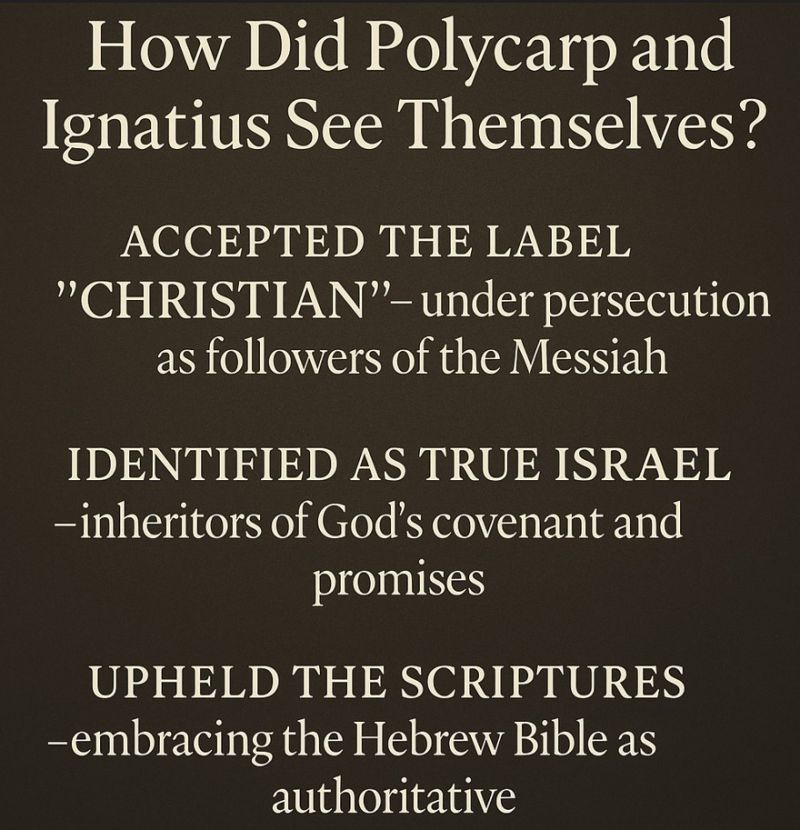Were they Christians, Jews, or Israel?
🔑 The Answer: All three in different ways
Let’s break it down:
🧔♂️ 1. They Accepted the Label “Christian” — Under Pressure and Persecution
Both Polycarp and Ignatius clearly accepted and even embraced the term Christian — but in a very specific context:
Ignatius (Magnesians 4:1):
“It is fitting not only to be called Christians, but to be so in reality.”
Polycarp (Martyrdom 10:1):
“I am a Christian. If you desire to learn the doctrine of Christianity, assign me a day and listen.”
-
The word Christian (Greek: Χριστιανός) was likely first used by pagans in Antioch (Acts 11:26) — possibly as mockery or scorn, like saying “Messiah-follower.”
-
For Polycarp and Ignatius, claiming that title during interrogation was an act of defiant faith.
-
It meant: Yes, I follow the crucified and risen Messiah of Israel.
They did not invent this term — they accepted it under fire, like a brand burned into their identity by the world.
✡️ 2. They Still Identified as the True Israel
Neither Ignatius nor Polycarp ever says, “We’ve started a new religion.”
Instead, they speak as those who inherit the covenant, the Scriptures, and the promises — not reject or replace them.
Ignatius says:
“If we are still living according to Judaism, we confess that we have not received grace.” (Magnesians 8:1)
But he also affirms:
“The prophets, being inspired by his grace, lived according to Christ Jesus.” (Magnesians 8:2)
Key Insight:
-
Ignatius does not reject Israel — he redefines it.
-
For him, those who follow Messiah are the faithful remnant of Israel.
-
He criticizes Judaism apart from Christ, but sees the church as the true Israel, not a gentile sect.
🕊️ 3. Their Bible Was the Hebrew Scriptures
-
Polycarp’s Epistle to the Philippians quotes frequently from:
-
Psalms
-
Proverbs
-
Isaiah
-
Genesis
-
-
These were still their Scriptures — the Tanakh was their Bible.
-
They read it through the lens of Messiah Yeshua, not as a discarded Old Testament.
They did not see themselves as “ex-Christians” or “post-Jews.”
They saw themselves as the righteous remnant of Israel, those who had recognized the Messiah.
4. Christian Was a Badge, Not a New Religion
To them:
-
“Christian” = follower of the Messiah
-
“Israel” = God’s covenant people, now centered around the Messiah
-
“Jew” = Either ethnic identity or covenant status (they did not reject it, but spiritualized it)
This lines up with what Paul taught decades earlier:
“They are not all Israel who are descended from Israel… the children of promise are regarded as descendants.” (Romans 9:6–8)
📜 Summary Table
| Identity Term | Who Gave It | How Polycarp/Ignatius Treated It |
|---|---|---|
| Christian | Outsiders/pagans | Embraced under persecution as true Messiah-followers |
| Israel | Scriptural identity | Claimed as fulfillment of God's promises through Christ |
| Jewish | Ethnic/covenant label | Accepted the Scriptures, rejected Torah-without-Christ |
🧠 Final Thought
Polycarp and Ignatius never imagined themselves as starting a new “Christian religion.”
They understood themselves as:
-
Followers of the Jewish Messiah
-
The faithful Israel of God
-
Recipients of God’s promises to Abraham, Isaac, and Jacob
-
Willing to wear the world’s label “Christian” as a witness unto death
They bore the name “Christian” before the Roman governor —
But they lived as sons of Israel before the God of Abraham.
